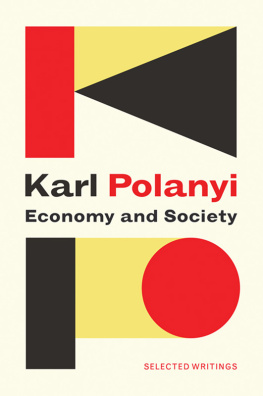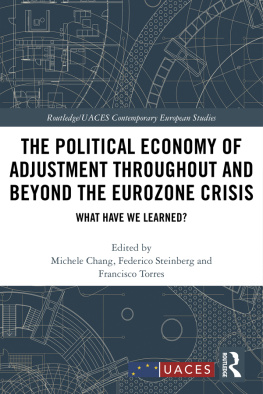Cangiani Michele - Economy and Society: Selected Writings
Here you can read online Cangiani Michele - Economy and Society: Selected Writings full text of the book (entire story) in english for free. Download pdf and epub, get meaning, cover and reviews about this ebook. City: Newark, year: 2018, publisher: Polity Press, genre: Politics. Description of the work, (preface) as well as reviews are available. Best literature library LitArk.com created for fans of good reading and offers a wide selection of genres:
Romance novel
Science fiction
Adventure
Detective
Science
History
Home and family
Prose
Art
Politics
Computer
Non-fiction
Religion
Business
Children
Humor
Choose a favorite category and find really read worthwhile books. Enjoy immersion in the world of imagination, feel the emotions of the characters or learn something new for yourself, make an fascinating discovery.
- Book:Economy and Society: Selected Writings
- Author:
- Publisher:Polity Press
- Genre:
- Year:2018
- City:Newark
- Rating:5 / 5
- Favourites:Add to favourites
- Your mark:
- 100
- 1
- 2
- 3
- 4
- 5
Economy and Society: Selected Writings: summary, description and annotation
We offer to read an annotation, description, summary or preface (depends on what the author of the book "Economy and Society: Selected Writings" wrote himself). If you haven't found the necessary information about the book — write in the comments, we will try to find it.
Economy and Society: Selected Writings — read online for free the complete book (whole text) full work
Below is the text of the book, divided by pages. System saving the place of the last page read, allows you to conveniently read the book "Economy and Society: Selected Writings" online for free, without having to search again every time where you left off. Put a bookmark, and you can go to the page where you finished reading at any time.
Font size:
Interval:
Bookmark:


Chapters 124 Kari Polanyi Levitt 2018
Introduction Michele Cangiani and Claus Thomasberger 2018
This collection Polity Press 2018
The right of Karl Polanyi, Claus Thomasberger and Michele Cangiani to be identified as Authors of this Work has been asserted in accordance with the UK Copyright, Designs and Patents Act 1988.
First published in 2018 by Polity Press
Polity Press
65 Bridge Street
Cambridge CB2 1UR, UK
Polity Press
101 Station Landing
Suite 300
Medford, MA 02155, USA
All rights reserved. Except for the quotation of short passages for the purpose of criticism and review, no part of this publication may be reproduced, stored in a retrieval system or transmitted, in any form or by any means, electronic, mechanical, photocopying, recording or otherwise, without the prior permission of the publisher.
ISBN-13: 978-1-5095-2330-6
ISBN-13: 978-1-5095-2331-3(pb)
A catalogue record for this book is available from the British Library.
Library of Congress Cataloging-in-Publication Data
Names: Polanyi, Karl, 1886-1964, author.
Title: Economy and society : selected writings / Karl Polanyi ; [introduction by] Claus Thomasberger, Michele Cangiani.
Description: Cambridge, UK ; Medford, MA : Polity Press, 2018. | Includes bibliographical references and index.
Identifiers: LCCN 2017048523 (print) | LCCN 2018001867 (ebook) | ISBN 9781509523344 (Epub) | ISBN 9781509523306 (hardback) | ISBN 9781509523313 (pbk.)
Subjects: LCSH: Economics. | EconomicsPolitical aspects. | EconomicsSociological aspects.
Classification: LCC HB71 (ebook) | LCC HB71 .P64 2018 (print) | DDC 330dc23
LC record available at https://lccn.loc.gov/2017048523
Typeset in 10.5 on 12 pt Sabon by Toppan Best-set Premedia Limited
Printed and bound in the United Kingdom by Clays Ltd, St Ives PLC
The publisher has used its best endeavours to ensure that the URLs for external websites referred to in this book are correct and active at the time of going to press. However, the publisher has no responsibility for the websites and can make no guarantee that a site will remain live or that the content is or will remain appropriate.
Every effort has been made to trace all copyright holders, but if any have been inadvertently overlooked the publisher will be pleased to include any necessary credits in any subsequent reprint or edition.
For further information on Polity, visit our website: politybooks.com
Kari Polanyi Levitt encouraged the compilation of this book and supported its publication. She contributed to it with valuable advice and the translation from German of four chapters. She also gave the publisher permission to reproduce the material in this volume, as the owner of Karl Polanyi's literary legacy. Both we and the publisher are extremely grateful to her.
Polanyi's manuscripts published in this volume are deposited with Concordia University Library and are available from the Karl Polanyi Institute of Political Economy, Concordia University, Montreal. We wish to thank the Institute and in particular its director, Marguerite Mendell, and Ana Gomez for their efficient and friendly support for our work.
We also wish to thank the Rosa Luxemburg Foundation, Berlin, and especially Michael Brie, for granting the permission to publish the translation of On Freedom from German.
Michele Cangiani and Claus Thomasberger
Karl Polanyi is regarded as one of the most influential social scientists of our epoch. His seminal book, The Great Transformation, is listed among twentieth-century classics. Polanyi was initially recognized as an economic anthropologist and historian. Later, his work entered the discourse of disciplines such as sociology, law and political science. Finally, and particularly since the beginning of the financial and economic crisis in 2007/8, he has become an indispensable point of reference in the broader public discussion. Leading intellectuals around the world refer to him as a source of inspiration. Economists, social scientists and activists engaged in challenging the current trends of neoliberal globalization, privatization and deregulation build on his writings. The 2016 Trade and Development Report of the United Nations Conference on Trade and Development describes the current situation as a Polanyi period, in which the regulatory and normative framework on which healthy markets depend, having already warped, is beginning to buckle [] Trust in political leadership is at an all-time low, just when the need for decisive political action is at an all-time high (p. ii).
In the critical discourse, Polanyi's notions, such as embeddedness, double movement, fictitious commodities, liberal utopia, self-regulating market system, transformation and patterns of integration, have become fundamental.
In our neoliberal era, an unprecedented wave of globalized investment and production, supported by an obsolete market mentality, and we are compelled to repeat this today.
Economic stagnation, increasing inequality, ecological and technological menaces, the decay of democratic institutions, the growing influence of nationalist parties and politicians, cultural and religious tensions as well as international conflicts threaten the social order established after the Second World War. There is a prevailing sense that political leaders have been overtaken by events, that they have lost control of the situation and thus confine themselves to denying the conflicts and buying time.
Polanyi would not have been surprised by current events neither by the attacks on democracy nor by the rebellion against economic globalization, commodification and the loss of cultural identity. He regarded the liberal project of institutionally separating the market system and subordinating the whole of society to its rules as no more than a first, utopian and historically limited response of humankind to the challenges of a technological civilization. His analysis of the collapse of the nineteenth-century European institutional set-up, the Great Depression, the rise of fascism and two world wars invites comparison with the present crisis of the neoliberal institutional arrangement. Are we now witnessing the social and political disintegration of the neoliberal version of the nineteenth-century market economy that resulted in the Great Depression?
The latest financial crisis has exposed the fragility and limitations of modern civilization, thus bringing the question of the market society's future into the centre of the public discourse. Throughout his life, Polanyi was concerned with the human condition in contemporary social organization. The continuing relevance of his writings depends on the depth of his insight that a capitalist economy requiring ever larger markets and investment opportunities is incompatible with the human need for mutually supportive social relations and a well-balanced use of natural resources.
Robbed of the protective covering of cultural institutions, states an often quoted passage of The Great Transformation human beings would perish from the effects of social exposure; they would die as the victims of acute social dislocation through vice, perversion, crime, and starvation. Nature would be reduced to its elements, neighbourhoods and landscapes defiled, rivers polluted, military safety jeopardized, the power to produce food and raw materials destroyed.
Next pageFont size:
Interval:
Bookmark:
Similar books «Economy and Society: Selected Writings»
Look at similar books to Economy and Society: Selected Writings. We have selected literature similar in name and meaning in the hope of providing readers with more options to find new, interesting, not yet read works.
Discussion, reviews of the book Economy and Society: Selected Writings and just readers' own opinions. Leave your comments, write what you think about the work, its meaning or the main characters. Specify what exactly you liked and what you didn't like, and why you think so.













